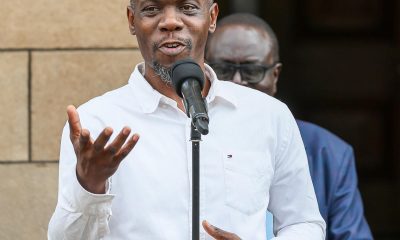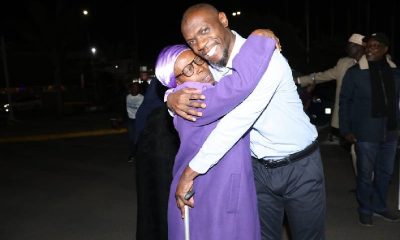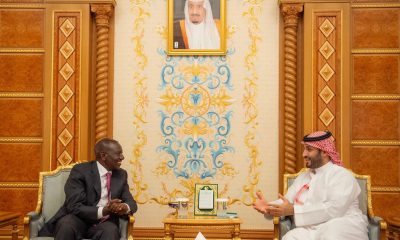News
Kenyan Stephen Munyakho Escapes Execution in Saudi Arabia After Payment of Sh129M ‘Blood Money’
Munyakho has since spent 13 years in different Saudi prisons, including Shimeisha Prison in Mecca, facing multiple execution dates that were postponed through diplomatic interventions.
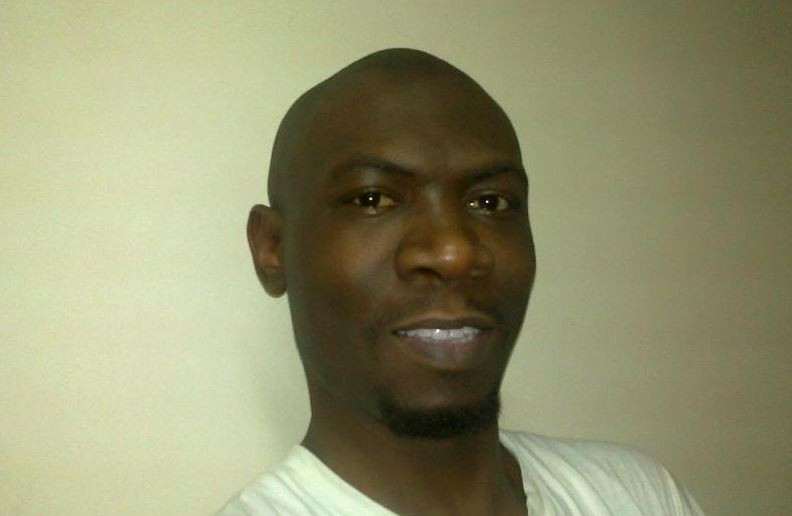
Freedom after 13 years: The extraordinary journey of a Kenyan man who narrowly escaped death row through diplomatic intervention and Islamic law
NAIROBI, Kenya – In a dramatic turn of events that has captivated the nation, Stephen Abdukareem Munyakho, a Kenyan who spent more than a decade on death row in Saudi Arabia, walked free on Tuesday morning after the payment of $1 million (approximately Sh129 million) in ‘blood money’ under Islamic law.
Foreign Affairs Principal Secretary Korir Sing’oei confirmed Munyakho’s release at 10 am local time, marking the end of a harrowing 13-year ordeal that began with a fatal altercation between friends in 2011.
“Our Mission in Riyadh has confirmed that Steve performed his Umra (minor pilgrimage) upon release,” Sing’oei announced in an official statement. “We shall provide further details regarding his arrival in the country. I commend all who have offered their support towards securing this outcome.”
From friendship to fatal fight
What started as a heated argument between Munyakho and a Yemeni colleague in 2011 escalated tragically, resulting in his friend’s death.
Initially charged with manslaughter and sentenced to five years imprisonment, Munyakho’s fate took a dramatic turn when Saudi authorities upgraded the charges to murder, carrying the death penalty under Shariah law.
The case highlighted the complexities of Saudi Arabia’s justice system, where Islamic law governs criminal proceedings.
Under this system, the victim’s family holds significant power in determining the perpetrator’s fate, including the option to accept ‘diyah’ blood money in lieu of execution.
A mother’s unwavering fight
Central to Munyakho’s salvation was his mother, Dorothy Kweyu, a veteran journalist whose tireless advocacy became the driving force behind his eventual freedom.
For over a decade, Kweyu campaigned relentlessly, appealing to government officials, human rights organizations, and well-wishers to raise the substantial sum required for her son’s freedom.
Her persistence paid off when the Supreme Council of Kenyan Muslims (Supkem) took up the cause.
After Kweyu personally visited their offices, Supkem began engaging key partners in Saudi Arabia to negotiate Munyakho’s release.
“Munyakho’s case was given special consideration, given that there was no premeditated intent to kill,” explained Supkem Chairman Hassan Ole Naado.
“It was observed that Steve never intended to kill the victim given that he and the victim were, in fact, good friends save for the very unfortunate fight that led to the victim’s death.”
The power of blood money
The breakthrough came earlier this year when the Muslim World League, with support from the Kenyan government and religious leaders, facilitated the crucial payment of diyah to the victim’s family.
This ancient practice, rooted in Islamic jurisprudence and endorsed by the Quran, provides an alternative to retributive justice.
The concept of diyah, originally set by Prophet Muhammad at 100 camels for murder or manslaughter, has evolved in modern times to cash payments that vary by country.
It serves as compensation to victims or their families and can lead to sentence reduction or, as in Munyakho’s case, complete pardon.
Today, diyah is applied in approximately 20 countries across the Middle East and Africa, including Sudan and northern Nigeria, offering hope for those caught in similar legal predicaments.
Diplomatic victory
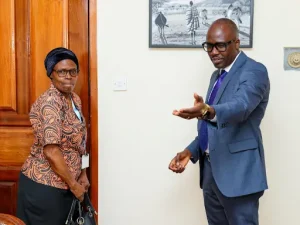
PS Sing’oei and Dorothy Kweyu, Steve’s mother in May 14, 2024 as they heightened the efforts for his release.
The successful resolution of Munyakho’s case represents a significant diplomatic achievement for Kenya.
UDA Secretary General Hassan Omar revealed that the settlement was secured following direct intervention by President William Ruto, demonstrating the government’s commitment to protecting its citizens abroad.
The case had previously seen several postponements of execution dates, including a reprieve in October 2024 when Saudi authorities delayed Munyakho’s scheduled November execution by one year, providing crucial time for negotiations.
As Munyakho prepares to return home after performing the Umra pilgrimage a symbolic gesture of renewal and gratitude his case serves as both a cautionary tale and a testament to the power of persistent advocacy.
His story highlights the importance of understanding local laws when working abroad, the significance of diplomatic relations, and the role of religious and cultural institutions in international justice matters.
For the Kenyan community, Munyakho’s freedom represents not just one man’s salvation but a successful example of how government, religious leaders, and civil society can collaborate to protect citizens in distress overseas.
The exact details of his return to Kenya are expected to be announced by the Ministry of Foreign Affairs in the coming days, bringing closure to a case that has gripped the nation for over a decade.
Kenya Insights allows guest blogging, if you want to be published on Kenya’s most authoritative and accurate blog, have an expose, news TIPS, story angles, human interest stories, drop us an email on [email protected] or via Telegram
-

 Grapevine6 days ago
Grapevine6 days agoAlleged Male Lover Claims His Life Is in Danger, Leaks Screenshots and Private Videos Linking SportPesa CEO Ronald Karauri
-

 Lifestyle1 week ago
Lifestyle1 week agoThe General’s Fall: From Barracks To Bankruptcy As Illness Ravages Karangi’s Memory And Empire
-

 Grapevine2 days ago
Grapevine2 days agoRussian Man’s Secret Sex Recordings Ignite Fury as Questions Mount Over Consent and Easy Pick-Ups in Nairobi
-

 Investigations2 weeks ago
Investigations2 weeks agoEpstein Files: Sultan bin Sulayem Bragged on His Closeness to President Uhuru Then His Firm DP World Controversially Won Port Construction in Kenya, Tanzania
-

 News2 weeks ago
News2 weeks agoAUDIT EXPOSES INEQUALITY IN STAREHE SCHOOLS: PARENTS BLED DRY AS FEES HIT Sh300,000 AGAINST Sh67,244 CAP
-

 Business2 weeks ago
Business2 weeks agoKRA Can Now Tax Unexplained Bank Deposits
-

 Investigations1 week ago
Investigations1 week agoEpstein’s Girlfriend Ghislaine Maxwell Frequently Visited Kenya As Files Reveal Local Secret Links With The Underage Sex Trafficking Ring
-

 News1 week ago
News1 week agoState Agency Exposes Five Top Names Linked To Poor Building Approvals In Nairobi, Recommends Dismissal After City Hall Probe

